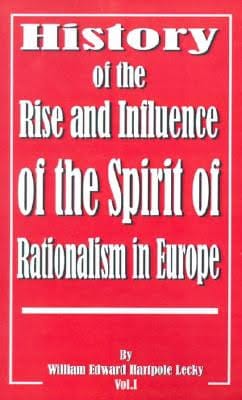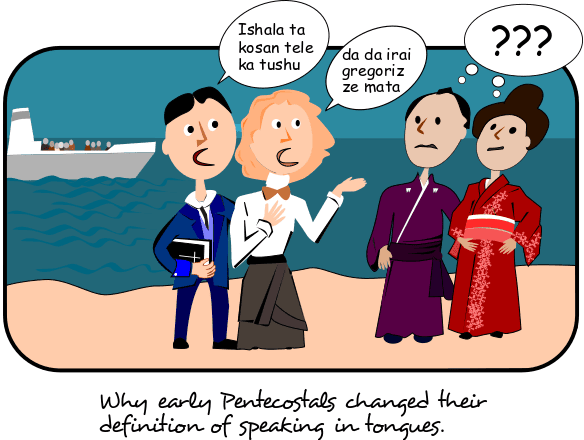The book A History of the Rise and Influence of Rationalism in Europe (2 vols., 1865) is a seminal piece of literature. This well written work helps to provide valuable insights for the modern reader with the backstory on the conversion of Europe from a mystical to a rational society.
This book was written by William Lecky, an Irish-Anglican historian and politician (1838–1903). He greatly succeeded in studying and narrating the complex and evolving web of rationalism, morals, miracles, the supernatural, Catholicism, and Protestantism into a systematic and comprehensive portrait.
Gift of Tongues
A fourfold aim of collating, digitizing, translating, and tracing the Christian doctrine of tongues from inception until 1906.
A History of Other Tongues in the English Bible infographic
The following infographic was created to describe why other tongues, otherwise known as strange tongues or unknown tongues was added to I Corinthians. The results may surprise many observers — this idiom was an English Bible translation phenomenon that started in the 1500s.
Summary of the Gift of Tongues Project: Introduction
Oops! This article was a mess. Something went wrong in the writing, editing, and coding process. The outcome was gobbledygook. The post is withdrawn. Sorry.
Pentecostals, Tongues, and Higher Criticism
The relationship between Pentecostals and the historians Philip Schaff, F. W. Farrar and others along with their influence on the modern definition.
How the traditional definition of tongues all but died and was replaced by the Pentecostal practice of Pentecostal glossolalia — an umbrella term for the language of adoration, singing and writing in tongues, and/or a private act of devotion between a person and God.
Before 1906 there were only two definitions of speaking in tongues within the traditional Christian practice:
- Tongues as the spontaneous ability to speak a foreign language not previously learned or known beforehand
- tongues as someone speaking in one voice and everyone hearing in their own language.
In the 1800’s, this definition expanded:
- Firstly, redefined as glossolalia: an ecstatic state that produces speech-like syllables. A social phenomenon, not a miraculous one
- then modern Pentecostal tongues: a spiritualization of the glossolalia doctrine.
The Azusa Street revival began as a traditional Christian tongues doctrine: many people imbued with the Holy Spirit were perceived with the ability to speak a foreign language spontaneously. The Azusa people and those involved in the greater grassroots holiness movement saw this as a sign to evangelize all the nations. This theology was called Missionary Tongues.
As previously noted in Pentecostal Tongues in Crisis, Pentecostal missionaries arrived at their foreign destinations and discovered they did not have this supernatural linguistic ability.
Solutions to the Pentecostal Tongues Crisis
Pentecostal solutions to the missionary tongues and gibberish crisis. Early Pentecostal excitement and enthusiasm for missionary tongues in foreign nations failed. They also had a serious challenge on the home front. The general public mocked them for speaking gibberish. These circumstances created an urgent need to build a Pentecostal apologetic for their speaking in tongues. …
Early Pentecostal Tongues in Crisis
An indepth look at the development, expansion, and failure of Pentecostal missionary tongues and a critical public that called it gibberish.
Early Pentecostalism and especially the Azusa Street outbreak of tongues in 1906 caused a revival in the practice of speaking in tongues. The outbreak initially continued a traditional one that parallels Christian history for over 2000 years. The early Pentecostals understood that certain individuals were inspired by the Holy Spirit to miraculously speak a foreign language. When this occurred, there was some perceived divine revelation on what language the person spoke. They understood this knowledge as a sign for the person to go to the people group or nation to tell the Good News. Unfortunately, this fervor was badly hit by a dose of reality. These Pentecostal missionaries arrived at their destinations and found that they did not have this ability.
Early Pentecostal Tongues: Intro
This five-part series (including the introduction) covers how the traditional definition of tongues all but died and replaced by a wider set of expressions; the language of adoration, singing and writing in tongues, and a private prayer language. This series was started to settle a mystery – why the doctrine of tongues had changed so …
V. P. Simmons on the Church History of Tongues
The early Pentecostal writer V. P. Simmons on the Church history of tongues–an important and early contribution to the Pentecostal doctrine of tongues. V. P. Simmons is an unknown name in the annals of Pentecostal history and even more so in the general historical records. However, the impact of his historical thesis which connects the …
Garr’s Missionary Crisis on Speaking in Tongues
Alfred Garr, a pioneer missionary of the Azusa Street Revival in the early 1900s explains why his conferred supernatural gift of the Bengali language did not work upon his arrival in India.
Garr believed that the gift had switched to another language while in voyage and Bengali never reappeared.
This case is one of the earliest documented examples of the tongues crisis facing Azusa missionaries. Many traveled the world thinking they were endowed with a certain foreign language and upon arrival, did not. The resolution of this theological crisis became a foremost problem to solve.
The Pentecostal movement had a number of choices to address the issue, admit they were wrong, redefine, or ignore. Garr chose to redefine it.

